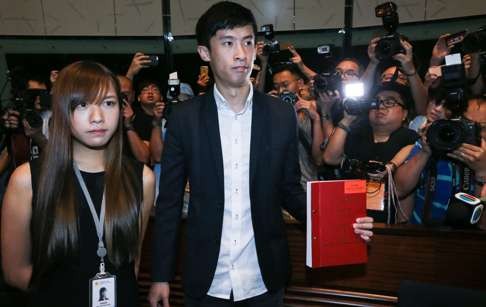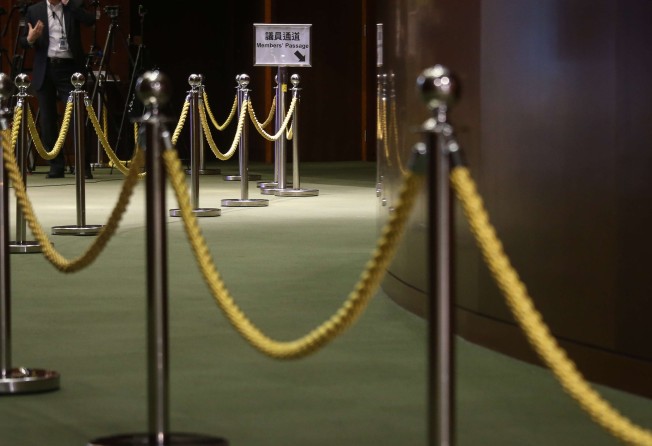
Beijing pre-empting court ruling on oath-taking case will be first such instance involving Basic Law interpretation
Observers mixed over possible central government move sparked by controversial swearing-in saga of Youngspiration duo

While China’s top legislative body may interpret Hong Kong’s mini-constitution for a fifth time, the pre-empting of a court case already in consideration would be a first.
Legal academics and lawmakers from both the democratic and the pro-establishment camps have called for the controversial oath-taking case by two localist lawmakers to be dealt with by local courts.
Sixtus Baggio Leung Chung-hang and Yau Wai-ching from Youngspiration had earlier used derogatory language to insult China in their first-oath taking. The government is seeking to disqualify both.

The court is set to hear arguments tomorrow from lawyers for the government, the Legco president and the Youngspiration duo.
Article 158 of the Basic Law says the court can seek an interpretation from the National People’s Congress Standing Committee over affairs which are the responsibility of the central government or concerning its relationship with Hong Kong.
Only one of the previous four interpretations was an outcome of the court’s request. The rests were either raised by the Hong Kong government or Beijing.
In 1999, the Court of Final Appeal ruled that Ng Ka-ling, a child born on the mainland to a Hong Kong father, had a right of abode in the city, sparking Tung Chee-hwa’s administration to request Beijing for an overturn of the court’s decision.
Tung’s government warned the ruling would mean 1.7 million mainlanders could flock to the city in a decade. The legal sector called Beijing’s reversal of the verdict “the death of judicial independence”.
The second interpretation came at Beijing’s instigation in 2004 and related to reform for universal suffrage. The committee, to the chagrin of pan-democrats, interpreted that any changes to the city’s election policies would have to be approved by Beijing.
The third occasion was initiated in 2005 by Donald Tsang Yam-kuen, then acting chief executive, to address his succession after Tung stepped down in the middle of his second term.
The committee ruled that Tsang should serve two years – the remainder of Tung’s term – before the court could hear a judicial review launched by a lawmaker.
The most recent case came in 2011 when the Court of Final Appeal, at the suggestion of the government, asked the committee to determine the issue of state immunity from legal action in a lawsuit between an American company and the government of the Democratic Republic of the Congo.
Johannes Chan Man-mun, University of Hong Kong professor specialising in constitutional law, said if the committee pre-empted the court just two days before the hearing, it would “destroy the rule of law and the two systems”.
“How would any person or investor ever trust our judicial system if the judicial process could be pre-empted by a political process like that?”
Priscilla Leung Mei-fun, pro-Beijing lawmaker and a law professor from City University, said the case can be resolved here, but noted an interpretation could be a starting point to discuss the “one country, two systems” policy.